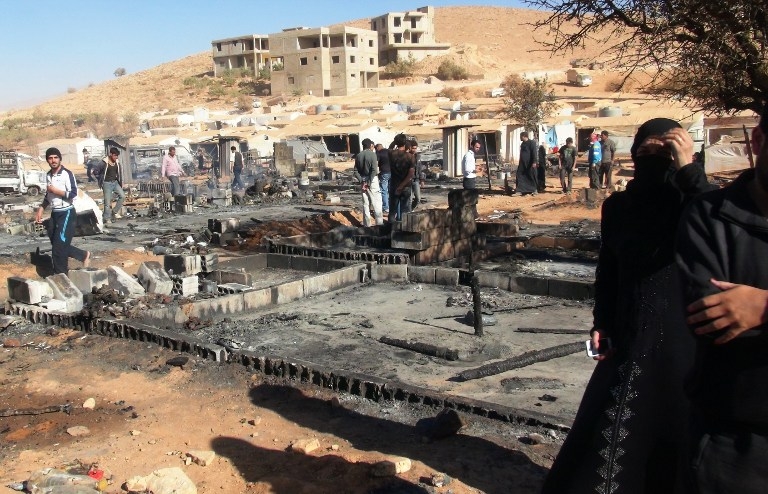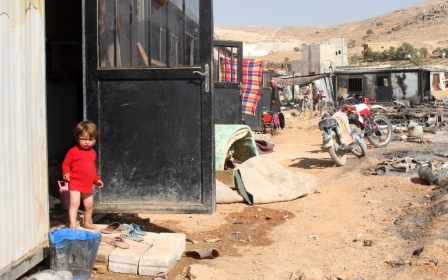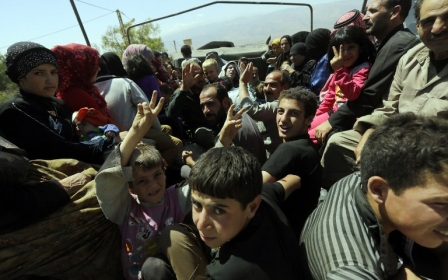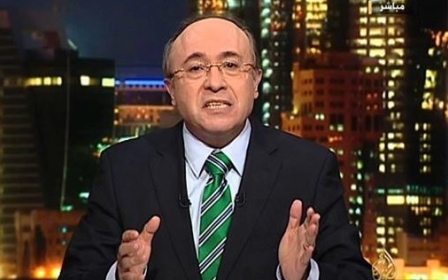Tensions around Lebanon’s security worsen

ARSAL - The year’s first seasonal rain belted the canvas tents staked out in the hilltop border town of Arsal this past weekend, compounding the misery of those Syrian refugees recovering from a mass-roundup by Lebanese security forces last Thursday.
Hamid, 51, from Horsh Arab in Syria, was swept up in the arrests, and holds an x-ray of his broken ribs to prove it. He said heavily armed soldiers surrounded their tents at dawn, and forced the refugees out. The men were thrown into vehicles, handcuffed, and with bags over their heads.
On the drive to a military camp, Hamid said the soldiers stopped to kick and beat them. “They swore and accused us of belonging to IS and [al-Nusra Front],” he said. He and most of the other refugees held with him were returned to Arsal after questioning.
Since Arsal’s deadly clashes in August between the Lebanese army, and fighters from the Islamic State (IS) and al-Qaeda linked Nusra Front, tensions are running high.
Walid, 34, another Syrian from Horsh Arab, whose younger brother died fighting the Syrian government forces in the Qalamoun, said Nusra militants keep their families in Arsal while they go to battle.
“Nusra came to Lebanon because Hezbollah went to Syria and participated in the killing of Syrians,” he said. “We don’t hate Nusra. They don’t harm anyone. While IS was ‘made’ by Bashir Assad, Nusra was not.”
“Nusra is like a cat trapped in a corner,” adds Walid’s 56-year old mother, Jorea. “And when that happens, the cat fights back.”
IS and Nusra continue to hold at least 21 Lebanese security personnel hostage, and have executed three. After weeks of failed negotiations in Qatar between the Lebanese government and Nusra, a visit by Qatari negotiators to Nusra leaders in Arsal on Tuesday yielded the release of at least one hostage.
Lebanese security forces are intent on digging up militant ‘sleeping cells’ within Arsal, as well as across the Beka’a Valley, and in volatile cities like Tripoli and Sidon. Army checkpoints ring Arsal, effectively cutting off supply lines from the town to fighting groups in the Qalamoun mountain range above.
“The priority is for the army to stay in Arsal to keep it safe from terrorists,” said army spokesman Colonel Ali Kanso. “The second priority is to fight the terrorists in the mountains, and not allow them to come down to Arsal.”
Currently holed up in the Qalamoun mountain range bordering Syria and Lebanon, militant groups are encircled by the Syrian government forces on one side, the Lebanese army and Hezbollah forces on the other.
With the cold winter approaching fast, both are looking to secure a base in the largely sympathetic Sunni town of Arsal in the foothills of the Qalamoun. It is an essential re-supply spot for Nusra fighters, focused on their battle within Syria, while IS seeks to expand their reach in Lebanon.
Syrian refugees now outnumber Arsal’s estimated population of 35,000. According to the UNHCR, there are 42,000 refugees in Arsal, but unofficial estimates are much higher.
Refugees said they have limited access to UNHCR and government registration, frightened to travel without documents through army checkpoints. Although the town's Sunni residents are largely sympathetic to the Syrian rebellion, the recent clashes have turned some against their guests.
But the refugees strongly oppose Lebanese Interior Minister Nouhad Machnouk’s proposal last week to move them out of Arsal to defuse tensions, believing they will be further vulnerable to attack.
The reported abuse of Syrian refugees by Lebanese soldiers is feeding the popularity of groups like ISIS and Nusra among the refugees and in pockets of Lebanon’s Sunni community.
Human Rights Watch (HRW) has documented a rise in targeted attacks on Syrian refugees by Lebanese civilians as well. Lebanon currently hosts over 1 million of the nearly 3 million officially registered Syrian refugees region-wide.
“Attacking Syrian refugees won’t bring back the abducted soldiers or solve the country’s refugee crisis,” said Nadim Houry, the HRW deputy director for the Middle East and North Africa, in their report. “The attacks on Syrian refugees will only increase their misery and add to instability and insecurity in Lebanon.”
On Saturday, the mountain highway linking Beirut to the Beka’a Valley, desperate family members of the hostages burned tyres again to protest the slow negotiations, leaving traffic snarled for hours and drivers enraged. “Let them all be executed,” muttered one truck driver who had waited an hour, referring to the hostages.
In their effort to free their relatives, the families echo the main demands of IS and Nusra to the Lebanese government; to release militant prisoners from Roumieh prison, and to open access to Arsal from the Qalamoun.
“The groups are using psychological warfare against Lebanon,” said Mario Abou Zeid, an analyst with the Carnegie Middle East Center, who believes a Lebanese military operation to free the hostages might take place if talks fail.
“IS and Nusra are applying pressure on the government from a military perspective. This can be taken as a balance of cutting the roads,” he said. “Blocking roads will only succeed in cutting the supply lines of the Lebanese army to the Beka’a Valley, and by extension Arsal. They are using the families in retaliation to put pressure on the army, because the army have blocked the roads and supply lines between Arsal and the Qalamoun.”
Ten kilometers north of Arsal, along the same mountain foothills lies the picturesque Christian town of Ras Baalbek. Like many towns in the area, it is used by families as a summer retreat, and is most vulnerable for attack in the winter when its residents return to their city jobs.
Recently targeted for kidnappings and robberies by nearby groups in nearby Arsal, the Lebanese army has beefed up its presence around the town. The main concern is to prevent Lebanon’s Christians and Muslims slipping into sectarian strife as well.
Dr Shibli Shibli, the town’s veterinarian, is one that feels secure, for now. “I have weapons in my house and I’m prepared,” he said. “I differ with my family who told me to come to Beirut. I want to defend my land until I die. Everyone here feels the same as me.”
Middle East Eye propose une couverture et une analyse indépendantes et incomparables du Moyen-Orient, de l’Afrique du Nord et d’autres régions du monde. Pour en savoir plus sur la reprise de ce contenu et les frais qui s’appliquent, veuillez remplir ce formulaire [en anglais]. Pour en savoir plus sur MEE, cliquez ici [en anglais].




